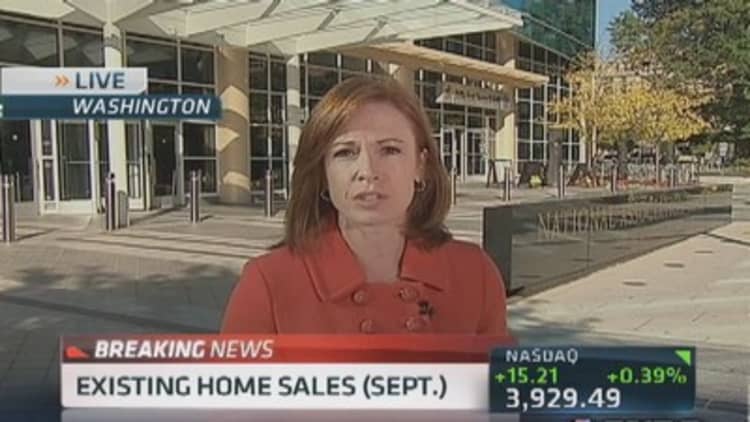Rising home prices and higher mortgage rates are a toxic cocktail for homebuyers, pushing affordability down dramatically.
Prices are up more than 12 percent from a year ago, according to several reports, and the average rate on the 30-year fixed is a full percentage point higher than it was last spring. It is now far harder for the average U.S. household to afford a home.
"The simple fact is that the very small improvement Americans have seen in their paychecks hasn't kept pace with a jump in home prices and mortgage rates," said Mike Sante, managing editor of Interest.com.
Of the top 25 housing markets, just eight are considered "affordable" for a median-income household, according to a new report from Interest.com. That is down from 14 affordable markets last year. The reason is largely that incomes, which are up just about 3 percent from a year ago, are not keeping pace with home prices.
To determine which markets are still most affordable, Interest.com calculated median home prices, median incomes, property taxes, insurance and household debt. It found Atlanta, Minneapolis, St. Louis, Detroit and Pittsburgh to be most affordable. Miami, Los Angeles, New York, San Diego and San Francisco are currently the least affordable markets.

Existing home sales fell nearly 2 percent in September from the previous month, and Lawrence Yun, chief economist for the National Association of Realtors, said he expected sales to decline further through the rest of 2013.
(Read more: Mortgage applications fall, even as rates drop)
"Affordability has fallen to a five-year low, as home price increases easily outpaced income growth," wrote Yun in the September sales report. "Expected rising mortgage interest rates will further lower affordability in upcoming months."
While mortgage rates are higher, credit availability is really the main barrier for many first-time homebuyers. This crucial segment of the housing market represented just 28 percent of buyers in September, down from 32 percent a year ago, and a far cry from the historical norm of around 40 percent. All-cash buyers represented an abnormally high 33 percent of sales.
First-time buyers usually purchase lower-priced homes, but sales of homes priced under $100,000 were down more than 7 percent in September from a year ago, while sales of homes priced above $500,000 were up over 40 percent, according to the NAR.
(Read more: Map: Tracking the recovery)
As the housing market heads into a colder, slower season, home price gains may moderate some. Mortgage rates could as well, given the turmoil in Washington, D.C., over the nation's debt limit.
"After speculation of drastic cuts in bond purchasing, last month's announcement from the Federal Reserve to not lower its amount of monthly bond purchases was welcomed by the mortgage industry," said Don Frommeyer, president of the National Association of Mortgage Brokers. "The strategic move keeps interest rates low and helps continue to attract buyers to the housing market."
(Read more: JPMorgan deal could curtail credit)
Confidence, however, will continue to reign supreme in the housing recovery, and if the government shuts down yet again, and lawmakers come to yet another impasse over the debt limit, buyers may stay on the sidelines. New mortgage regulations also go into effect on Jan. 1, 2014, which will make mortgages more expensive for some borrowers and could put loans out of reach for others.
—By CNBC's Diana Olick. Follow her on Twitter @Diana_Olick.
Questions? Comments? facebook.com/DianaOlickCNBC



